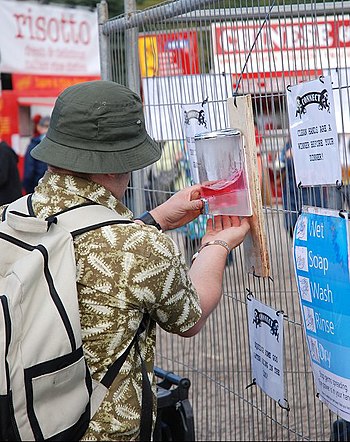Geylang Food poisoning
Ong Dai Lin and Teo Xuan Wei
dailin@mediacorp.com.sg
 Fifty hawkers from four food centres polled yesterday by Today say they are more vigilant about hygiene.
Fifty hawkers from four food centres polled yesterday by Today say they are more vigilant about hygiene.DON WONG
HOW do the authorities decide when to issue health advisories in food poisoning outbreaks?
On Saturday, the Ministry of Health (MOH) was notified of 12 new cases of food poisoning — with the affected individuals all having gone to the steamboat restaurant
Ba Shu Ren Jia at Lorong 9 Geylang — and it immediately advised the public about the incident in its daily updates on the rojak food poisoning outbreak.

When the
National Environment Agency (NEA) closed the Rojak Geylang Serai stall on April 4 and told its stallholder that about 100 people had fallen ill, though, only the two newspapers which sent in queries —
The New Paper and Berita Minggu — carried information about the probe. The agencies replied to other media queries the next day.
Responding to queries from Today about the steamboat restaurant advisory, a MOH spokesman said that in view of the recent mass food poisoning cases, “it was timely for a quick update to emphasise the importance of personal and environmental hygiene”.
MOH and NEA had advised members of the public who have patronised the restaurant and are experiencing symptoms of food poisoning to seek immediate medical attention. Last night, the agencies also urged the public dining in steamboat restaurants to cook their food thoroughly before consumption.
Going into detail about its investigations into the earlier outbreak, MOH said it was alerted to the first cases of food poisoning by
Changi General Hospital on Friday, April 3 at 10pm.
The ministry had to “investigate further and verify the facts before making any public announcements”. Investigations were “conducted immediately at the hospital in the early hours of the morning of April 4”.
After the stall was closed, inspections were carried out and “as more incidents were notified over the weekend, investigations further strengthened the association with consumption of Indian Rojak at the Rojak Geylang Serai. A joint MOH and NEA press release was issued on Monday to alert the public”, MOH said.
“Even while pending investigation, MOH also confirmed the facts with the media on Saturday itself and over the weekend.”
Asked about its considerations in alerting the public, the ministry said it issues health advisories “when there are outbreaks of diseases and illnesses” as part of its “efforts to advise the public to take precautions when there is a risk to public health”.
MORE VIGILANT
The number of food poisoning cases from the rojak stall has remained at 154 cases since Thursday, and there are now three patients still recovering in the hospitals, in stable condition.
And in the wake of the outbreak, 50 hawkers from four food centres polled yesterday by Today say they are more vigilant about hygiene. “We’re always very careful but the
Indian rojak incident is a reminder that hygiene is a serious issue that we have to be careful all the time,” said a hawker at the Upper
Boon Keng market and
food centre, who only wanted to be known as Mr Jeffery.
All the food vendors said that, even before this, they have been careful about hygiene “every time”.
“If I know my customers fell ill after eating my food, I won’t be able to rest peacefully at night. I might even lose my business,” said Mr
John Lim, 42, a hawker at the Old Airport Road food centre.
But hawkers also told Today that they would pay more attention to hygiene if the hawker centre they are in is cleaner.
Mr Chua Hua Kay, a hawker at Bedok Central food centre, said: “If the surroundings are very clean, the stall has to be very clean, too. Customers will not want to see a dirty stall in a clean hawker centre.”
From TODAY, News – Monday, 13-April-2009


















